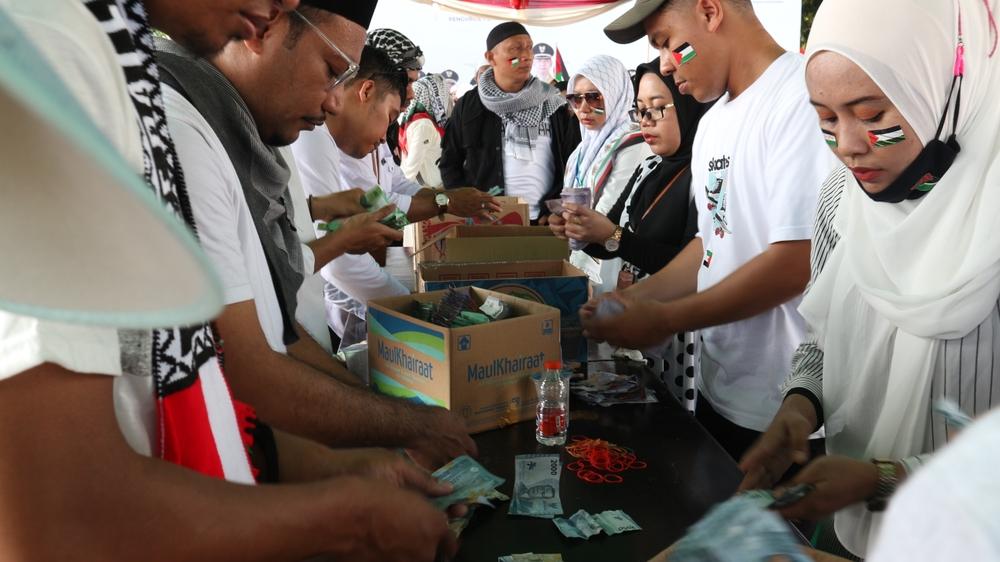
Palestine is going through the biggest humanitarian crisis ever. Where the new year began with ostentatious displays of lighting around the world, the skies in Gaza remain darkened by the incessantly looming attacks. Homes, hospitals, mosques, schools, and refugee camps have been destroyed. Around 22,000 Palestinians in Gaza have now been killed, out of which nearly 7,000 are children. Almost 57,000 are reported to have been injured so far. With peace attempts being considerably insufficient, these figures are likely to rise in the coming days.
In these disastrous circumstances, Gaza needs the support of compassionate people more than ever. Islam attaches great importance to helping the oppressed against violence. There are many examples of this in the life of the Messenger (PBUH). Before receiving Prophethood, the Prophet (PBUH) participated in an agreement held amongst the nobles of Banu Hashim to suppress violence and injustice. He (PBUH) commended this confederacy in the following words.
“It was more appealing to me than herds of cattle. Even now, in the period of Islam, I would respond positively to attending such a meeting if I were invited.” [Ibn Hisham 1/113, 135]
The Prophet (PBUH) remembered and honoured the above agreement even after revelation started. This shows his dedication to the struggle for peace and justice. The believers are also encouraged to continue the Sunnah and help the weak and oppressed, following the Prophet’s (PBUH) footsteps.
While donating to charitable organisations will help boost the aid work in Palestine, there are many other ways to help as well. Some of these include educating oneself and one’s family, spreading general awareness, engaging the local community through mosques and other places of worship, holding special prayers, participating in popular campaigns, volunteering, and fundraising.
Many people have shown solidarity with Palestine by writing to local politicians and making them aware of their sentiments. This needs to continue in order to attain validity among those in power and potentially reach a ceasefire. We must keep up the efforts to protest against the violation of human rights in Palestine and make our voices heard within influential circles.
One of the most practical ways of helping Palestine is involving the local community in relevant activities held at the local mosque. A mosque in a Muslim community plays a central role in times of need. It is a house of Allah (SWT) where believers from all backgrounds unite to worship Him and earn His Pleasure. Islam places great importance on supporting those suffering from violence. To achieve this, the first defence of a believer is prayer. According to a hadith of the Prophet (PBUH):
“Dua is worship.” [Adab al-Mufrad 714]
It is important for believers to unite and supplicate in prayers for those being oppressed in Gaza. Muslims are encouraged to recite dua-al-qunoot in difficult circumstances, which is a special supplication made during formal prayers in the congregation.
Regular talks by the Imams and other speakers can have a huge impact on increasing the understanding of the humanitarian crises in Palestine. Places of worship provide a common platform to create a strong network of substantial support.
There are various campaigns calling for a boycott of companies involved in assisting the violence in Palestine. Join hands with them to make an impact on their sales. In addition to this, there is advice available on alternative products. Use this information to buy and promote the existing alternatives and businesses.
It is important to make positive use of social media to bring positive change. While some try to use this platform to spread rumour and hate, it can be wisely used to spread love and truth. The internet and social media are highly effective in promoting aid work in Palestine. Many charitable organisations launch their aid appeals through this medium. As individuals, we can promote their appeals by sharing or liking their web pages or online channels. Even visiting certain websites helps increase their popularity. There are many organisations coordinating Gaza fundraisers, which include campaigns like education aid for Palestine, in addition to other aid work. Like or share their work to support the fundraisers for Palestine.
Volunteering is a great way of standing up for what you believe in. By giving some of your time and effort, you can play your part in supporting Palestine. You can choose to volunteer for a humanitarian or charitable body and assist in their Palestine fundraiser. You can also choose to contribute your energies in other constructive ways.
Every individual has specific skills. You can use your skills and talents to express solidarity with those suffering today. It can be done by creating and posting useful information, painting, sketching, and writing articles or poetry. Every little action goes a long way towards making a lasting impact. Give to Palestine by putting your knowledge and expertise to good use. Every good deed to help those in need is Sadaqah. Your efforts in this regard will weigh highly on the scales in the hereafter. The Prophet (PBUH) is reported to have said:
“Every man will be in the shade of his charity on the Day of Resurrection.” [Sahih al-Jaami (4510)]
We are a faith-based British international charity that provides help to people who are victims of natural disasters or conflict or suffering from poverty, hunger, disease, homelessness, injustice, deprivation or lack of skills and economic opportunities.
© Copyright 2024. Muslim AidMuslim Aid - Help Muslims Around the World in Need . All Rights Reserved.
Charity CIO No. 1176462
Serving humanity since 1985.


Your donation will provide help to people who are victims of natural disasters or conflict or suffering from poverty, hunger, disease, homelessness, injustice, deprivation or lack of skills and economic opportunities.
